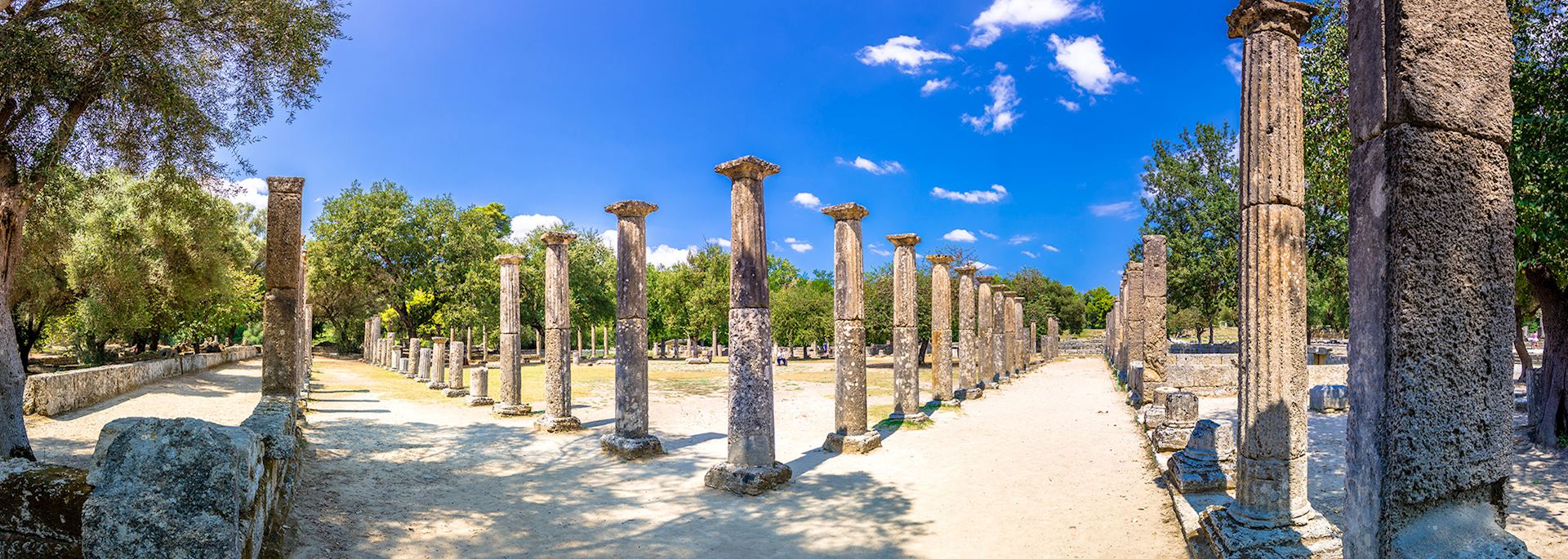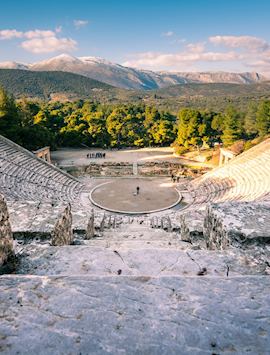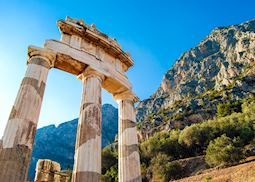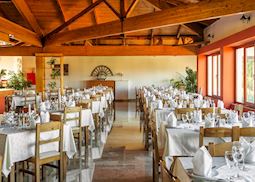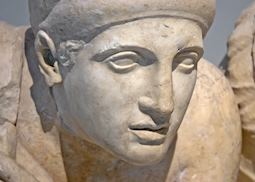Jump to:
Birthplace of the Olympic Games, the shady site of Ancient Olympia is one of the largest archaeological attractions in Greece.
It was dedicated to Zeus, the king of the Greek gods, and set at the spot where he allegedly defeated his father, Cronus.
Athletes journeyed from far and wide to take part in the games here. In its heyday, the city had 70 temples and numerous pathways lined by statues, altars, treasuries and dedications to deities. Although largely ruined, the sheer scale of the site is impressive and gives you a powerful indication of just how important athletic competition was in ancient Greece.
Ancient Olympia was in use for roughly 1,000 years from the 8th century BC. Over the course of the centuries, structures were added and the Romans restored and reconstructed many of the original Greek temples, opening the games to all citizens of the Roman Empire.
Then, as now, the games were held every four years until the practice was banned in 393 by Christian emperor Theodosius I. A series of earthquakes, attacks and floods led to the site finally being abandoned in the early 7th century.
Over time, the area was covered in a thick deposit of mud from either river flooding or a series of tsunamis. It was rediscovered in 1766 and excavations have been ongoing since.
The idea of peaceful competition and a celebration of athleticism was at the heart of the games. Before the event began, a ‘sacred truce’ was agreed, with all hostilities suspended during the competition.
Each athlete and trainer had to swear to compete fairly without cheating or corruption, and fines were doled out for any athlete caught bribing opponents. Running, discus, javelin, long jump, wrestling and equestrian events took place, and it was a huge accolade to be crowned with the kotinos, the champion's olive wreath.
The 2nd-century gymnasium and palaestra (wrestling ground), as well as the stadium, are some of the most impressive ruins on the site. The stadium could seat 45,000 spectators, with women and slaves relegated to watching from the nearby Hill of Kronos. Inside the stadium you can still see the running track.
The most intact structure on the site is the 6th-century Doric Temple of Hera. But, in its zenith, Olympia’s crowning glory was the massive 5th-century Temple of Zeus. Only a single column remains, but it’s enough to give you a good impression of the original size of the temple and the ivory-and-gold Statue of Zeus, one of the Seven Wonders of the Ancient World, which was housed here.
In a tradition that has filtered down to the modern Olympics, a fire was lit and maintained throughout the games. In ancient times, the fire burned at the altar of Hestia as a symbol of the fire stolen from the gods by Prometheus. Today, the Olympic flame is lit at the Temple of Hestia before it begins its long journey to the games.
The archaeological museum goes a long way to helping you put the site into context. Models show how Olympia looked in its glory days, and a wide-ranging collection of exhibits span the site’s past from prehistory to Roman times.
Statues, partial temple reconstructions, sacrificial tools, ceramics and votive offerings bring the site to life. The highlight is the pediments and metopes (decorative panels) from the Temple of Zeus.
The modern town of Olympia sits a five-minute walk from the site. Apart from a single street lined with souvenir shops and some restaurants, it has little of interest for visitors.
Best time to visit Olympia
Olympia is a good year-round destination, but April to June and September and October have the most pleasant weather for exploring the site and fewer visitors than peak summer season. In July and August, temperatures can reach 30°C (86°F), while winter weather can be cool and unpredictable.
who's been there
-
01993 838 92501993 838 027
- Make an enquiry
Suggested itinerary featuring Olympia
This sample itinerary will give you an idea of what is possible when you travel in Olympia, and showcases routes we know work particularly well. Treat this as inspiration, because your trip will be created uniquely by one of our specialists.
Places near Olympia
- Costa Navarino 45 miles away
- Nafplio 65 miles away
- Galaxidi 66 miles away
- Delphi 76 miles away
- Arachova 79 miles away
- Monemvasia 103 miles away
- Hydra 104 miles away
- The Peloponnese 114 miles away
- Athens 118 miles away
- Cape Sounion 131 miles away
- Meteora 145 miles away
- The Greek Islands 154 miles away
- Milos 166 miles away
- Corfu 170 miles away
- Sifnos 177 miles away
- Syros 183 miles away
- Tinos 194 miles away
- Folegandros 195 miles away
- Paros 200 miles away
- Mykonos 204 miles away
- Naxos 210 miles away
- Thessaloniki 219 miles away
- Santorini 228 miles away
- Crete 253 miles away
Photos of Olympia
Our expert guides to exploring Olympia
Written by our specialists from their own experiences of visiting Olympia, these guides will help you make the most of your time there. We share both our practical recommendations and the best ways to appreciate Olympia at its best.
-
Highlights of the Peloponnese ![Site of Ancient Olympia, Greece]()
Highlights of the Peloponnese
Highlights of the Peloponnese
Rural, mountainous and remote, the Peloponnese was considered a mythic and mysterious land by the ancient Greeks. Greece specialist Abby demystifies the region and discusses its wineries, classical ruins and opportunities for outdoor adventures.
Read this guide
Accommodation choices for Olympia
We've selected a range of accommodation options for when you visit Olympia. Our choices usually come recommended for their character, facilities and service or location. Our specialists always aim to suggest properties that match your preferences.
-
![Hotel Europa, Olympia]()
Hotel Europa Olympia
Olympia
Ideas for experiencing Olympia
Our specialists seek out authentic ways to get to know the places that could feature in your trip. These activities reflect some of the experiences they've most enjoyed while visiting Olympia, and which use the best local guides.
-
Ancient Olympia and the Olympia Museum ![Statue of Athlete, Olympia]()
Ancient Olympia and the Olympia Museum
Ancient Olympia and the Olympia Museum
Explore Ancient Olympia, the original site of the Olympic Games, with a local guide on a half-day tour that sheds light on the significance of the games in ancient times and its temples, training facilities and stadium.
View details -
Dinner in a local home ![Greek meze, Greece]()
Dinner in a local home
Dinner in a local home
Experience traditional Greek cooking and hospitality with a visit to a local home for dinner, where you can try many homemade Greek specialties, chat to your local host and gain insight into everyday life in Greece.
View details
